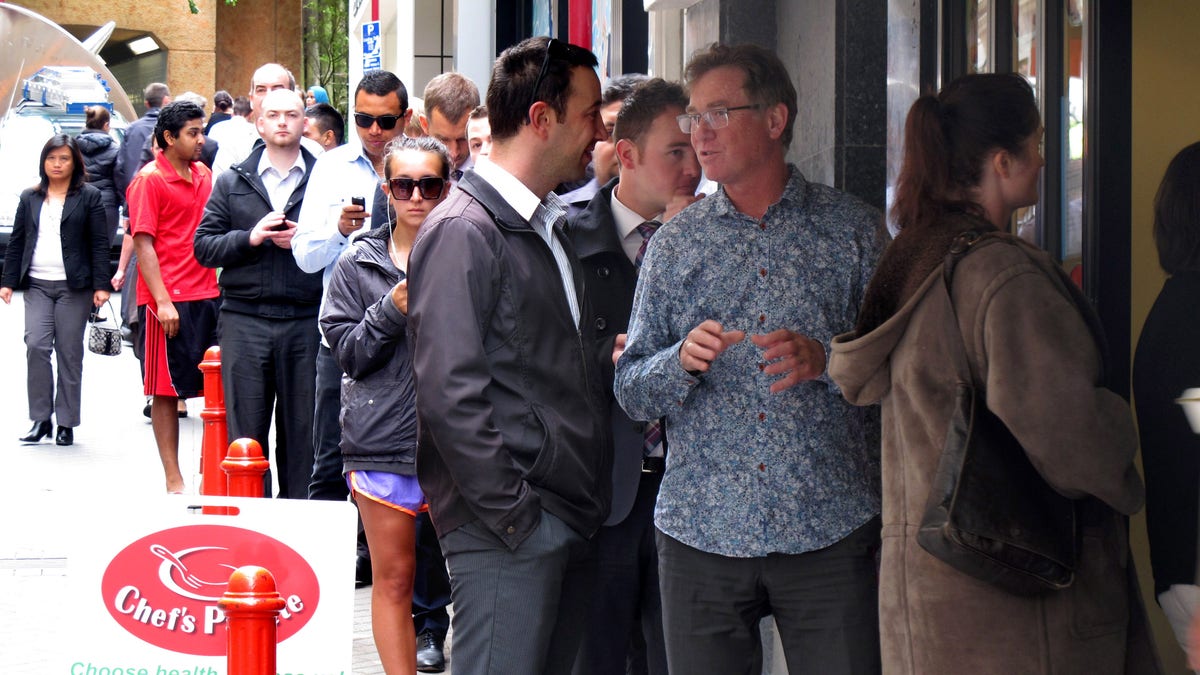
In this Tuesday, Jan. 28, 2014 photo, workers queue to get take-out lunches at the Chef's Palette eatery in Wellington, New Zealand. Five years after the global financial crisis, New Zealand is poised to become one of the first developed nations to begin raising interest rates in response to a thriving economy. The improving economy also seems to be slowing the exodus of residents to Australia, which boasts higher living standards than New Zealand and weathered the financial crisis better than almost every other nation thanks to a mineral boom. (AP Photo/Nick Perry) (The Associated Press)
WELLINGTON, New Zealand – Five years after the global financial crisis, New Zealand is poised to become one of the first developed nations to begin raising interest rates in response to a thriving economy.
The South Pacific nation of 4.5 million is benefiting from huge demand in China for its milk products and from the gathering pace of reconstruction in Christchurch, where a 2011 earthquake destroyed much of the southern city's downtown.
The improving economy also seems to be slowing the exodus of residents to Australia, which boasts higher living standards than New Zealand and weathered the financial crisis better than almost every other nation thanks to a mineral boom. But Australia's economy has begun slowing, just as New Zealand's takes off.
Economic growth has reached a healthy annual clip of 3.5 percent, better than most developed nations, and the trend is expected to continue. In its 2014 outlook, the OECD predicted New Zealand's GDP will expand by 3.3 percent, more than the 2.9 percent in the U.S., 2.6 percent in neighboring Australia, and 1 percent in the euro area.
Reserve Bank of New Zealand Governor Graeme Wheeler said Thursday that New Zealand's growth has "considerable momentum" and the bank expects to begin raising its benchmark interest rates "soon" from a record low of 2.5 percent. Most economists predict rate hikes will begin in March and continue throughout the year.
Some emerging economies including Turkey and South Africa recently raised rates, but in those cases it was an attempt to shore up their currencies rather than preventing a boom from overheating. The U.S. central bank, meanwhile, is reducing the level of extraordinary stimulus it has been giving the economy through bond purchases. Even after that stimulus is phased out, the Federal Reserve is expected to keep interest rates at record lows.
In New Zealand, a far different scenario is playing out. The central bank considers the Kiwi dollar as the local currency is known to be too high but is willing to risk it strengthening further to keep inflation and a heated housing market in check.
A typical lunch hour in the capital, Wellington, indicates the growing confidence among consumers. Queues form outside many popular eateries, including at the Chef's Palette, where a couple of dozen people stand in line waiting to get takeout salads or light meals.
Owner Xiao Xin said business has grown steadily since he opened in 2011, but customers remain price conscious. Many affluent city workers are willing to wait in line for a meal that cost about $5, he said, and when he last increased prices the queues disappeared for a while before customers began slowly returning.
"People are busy," he said. "They want fast, healthy food. But it has to be cheap."
Economic surveys indicate that everyone from New Zealand business owners to consumers are more confident than they have been since before the 2008 downturn. Unemployment remains a manageable 6.2 percent, and some farmers in the agricultural-driven economy have never experienced such good times.
"We are seeing very positive confidence out there in most of the rural sector. Dairying is head-and-shoulders above everything else," said Bruce Wills, president of the advocacy group Federated Farmers. "Farmers are getting the highest dairy payout in history this season."
Wills said many farmers have managed to reduce their debt and improve the infrastructure on their farms thanks to the milk boom. But he cautioned that volatility in prices and weather can quickly change the outlook. Some farmers are still recovering from a widespread drought last year.
New Zealand's Finance Minister Bill English said he's "pretty positive" about the direction of the economy but he's cautiously awaiting the rise in interest rates.
"We'll be one of the first countries in the developed world to be tightening monetary policy, and that poses some risk to the exchange rate," he said.
Generally, New Zealand politicians favor a lower dollar in order to make exports more competitive. As interest rates rise, investors seeking higher returns tend to push the Kiwi higher.
English said challenges remain in trying to get enough young people trained in the skills they need to enter the workforce and in reducing household debt levels, which remain high by international standards, due in part to the elevated price of homes.
Shamubeel Eaqub, the principal economist at the New Zealand Institute of Economic Research, an independent think tank, said the economy is in its best shape in at least seven years.
But he said at least one-third of GDP growth is coming from one-time factors such as reconstruction and high milk prices while underlying growth of 2 percent is not particularly strong.
Meanwhile Xiao, the lunch store owner, has several signs up advertising for kitchen hands and other staff. He wants to open a second store, he said, but is having trouble finding enough good workers to run it.
